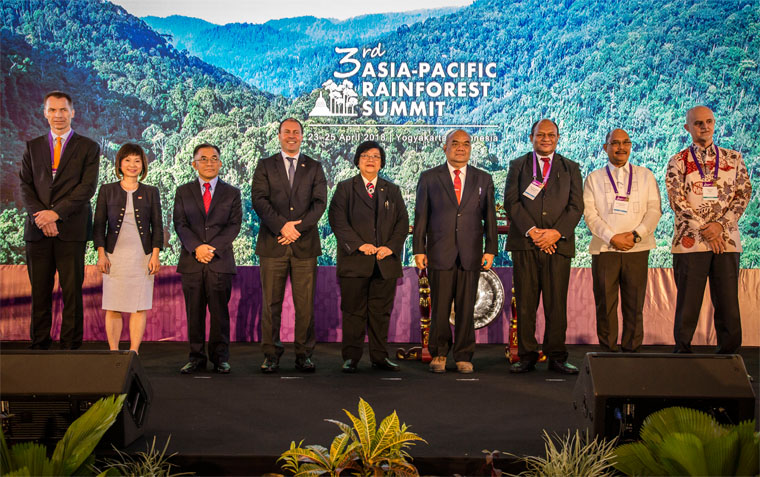Over 1,200 participants from over 40 countries across Asia-Pacific commenced a three-day meeting on Monday, April 23, 2018 in Yogyakarta, Indonesia, to foster cooperation and share best practices to avoid deforestation and promote sustainable growth.

At the 3rd Asia-Pacific Rainforest Summit (APRS 2018), representatives of academia, civil society, companies, governments and research institutions are discussing the role of forests in Nationally Determined Contributions (NDCs) and other commitments made by each country under the Paris Agreement in 2015.
The Indonesian Government, with the support of the Australian Government and in partnership with the Centre for International Forestry Research (CIFOR), is hosting this event. The opening sessions included the participation of ministers and other high-level speakers.
“More than 450 million lives depend on the sustainable management of forests,” reminded Indonesia’s Minister of Environment and Forestry, Siti Nurbaya Bakar. “Last year Indonesia took major measures to promote social forestry, setting a target to allocate 12.7 million hectares of land to social forestry by 2019.” She also highlighted the progress the country has made in fighting deforestation and future commitments. “In the last three years, we have managed to reduce the deforestation rate from 1.09 million hectares to 0.61 million hectares. We have a projected target of 0.45 by 2020 and 0.35 by 2030.”
Australia’s Minister for the Environment and Energy, Josh Frydenberg, celebrated the progress made in reducing emissions from forests and emphasised the importance of regional collaboration.
“With the collected and concerted efforts in our own countries and through our international partnerships, we are making progress. The hard work we have done together is starting to bear fruit,” Frydenberg said. “We need to maintain this momentum and step up the pace of change if we are going to protect our forests and people, while securing economic growth,” he remarked.
Regional best practices on rainforests and climate
APRS is a key regional event held every two years. Its goal is to generate practical action on forest conservation and to help achieve sustainable development in the Asia-Pacific region.
In this edition, APRS is showcasing national experiences and best practices in the areas of Community forestry; Ecotourism and conservation of biodiversity; Forest finance, investment and trade; Forests in Nationally Determined Contributions (NDCs); Mangroves and blue carbon; Production forests; and Restoration and sustainable management of peatlands.
In addition to the sessions on stage, government officials from countries across the region held a multilateral meeting and multiple bilateral meetings to discuss the ways in which they can cooperate.
